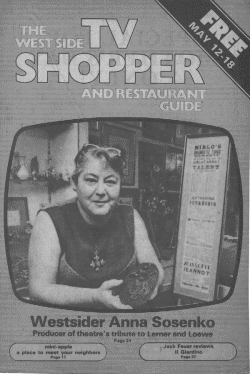Partner Hildegarde
Queer Places:
416 Kaighns Ave, Camden, NJ 08103
506 Chestnut St, Camden, NJ 08103
 Anna Sosenko (June 13, 1909 – June 9, 2000) was an American songwriter and impresario who flourished in the 1930s. She is perhaps best known as a manager and writer for cabaret singer
Hildegarde, for whom she wrote "Darling, Je Vous Aime Beaucoup".
Anna Sosenko (June 13, 1909 – June 9, 2000) was an American songwriter and impresario who flourished in the 1930s. She is perhaps best known as a manager and writer for cabaret singer
Hildegarde, for whom she wrote "Darling, Je Vous Aime Beaucoup".
Anna Sosenko was born in Camden, New Jersey, the daughter of Simon Sosenko and Rebecca Sosenko. Her mother ran a restaurant and boarding house.[1][2]
Simon and Rebecca Sosenko had come to Camden by the time the 1914 City Directory was compiled. They appear at 431 Mechanic Street, Simon's occupation being listed as "packer". The following year they had moved to 1401 Norris Street, where the operated a grocery store through at least 1917. By 1920 Simon Sosenko had moved his family and business to 237 Sycamore Street. The family would remain there through 1924. When the City Directory was compiled in 1926, the Sosenkos had moved to 416 Kaighn Avenue, where they operated
a kosher restaurant. They had moved to 506 Chestnut Street by 1929, and were still at that location in 1931. Besides the grocery and the restaurant business, and Simon and Rebecca Sosenko also rented rooms to traveling entertainers on the vaudeville circuit.
Sosenko lived and worked with Hildegarde from 1933.[5][14] The two met when
Hildegarde, touring as a pianist in scratch bands, lodged at Sosenko's
parents' boarding house in New Jersey. Young Anna, then a music student,
persuaded the entertainer to let her accompany her to New York, in a bid to
become a songwriter. In the event, she went on to oversee Hildegarde's own
career as a cabaret performer, in an act which was, according to singer Bobby
Short, "produced down to the last sigh, even to the blue spotlight that
brought out the colour in the red roses that invariably sat by her piano".
Sosenko is perhaps best known as the "formidable"[3] manager and writer for American cabaret singer and fashion celebrity Hildegarde,[4] for whom she wrote "Darling, Je Vous Aime Beaucoup" (1935).[1] "I made her a sensation long before she was a sensation," Sosenko said of her work, crafting Hildegarde's exotic public persona.[5] "Her ingenuity, her inventiveness, her organizational genius and her undying faith in her merchandise stamp Miss Sosenko as just about the smartest manager in show business today," declared journalist George Frazier, in a Life magazine profile of the pair in 1943.[2] Sosenko produced The Raleigh Room (1945-1947), a radio program starring Hildegarde, with Alan Jay Lerner as head writer.[5][6]
In the 1960s Sosenko managed another singer, Felicia Sanders.[7]
For 23 years, she and Hildegarde worked together as equal partners. In New
York, they shared a 10-room apartment and built up an art collection - chosen
by Sosenko - that included Renoir, Manet and 40 Rowlandsons. The partnership
never had anything so formal as a contract and exactly why it broke up in 1956
is not clear. As Hildegarde once said: "These things do happen after 20
years". The pair collected art, including works by French impressionists;[15]
that collection was sold when they separated in 1955.[16] They reconciled late
in life, and even performed together.
In 1959, Sosenko co-produced a stage adaptation of Irving Stone's The Passionate Journey.[8] She promoted
Jacqueline Susann's first novel, Every Night, Josephine.[9] In the 1970s and 1980s, she produced star-studded benefit shows, including tributes
Mary Martin, Ethel Merman, Richard Rodgers, Dorothy Fields, Joshua Logan, George Abbott,
Carol Channing, Alan Jay Lerner,
Frederick Loewe, Jule Styne and orthers..[10] She helped develop the Songwriters’ Hall of Fame, now known as the National Academy of Popular Music.[11]
Sosenko had a large collection of theatrical memorabilia,[12] and in 1965 opened a small gallery[13] selling and trading such materials near Lincoln Center.[9][11] She exhibited some of these at the Museum of the City of New York,[6] and eventually donated her collection to several theatre history archives, including the Library of Congress.[1]
Sosenko died in 2000, four days before her 91st birthday.[1][3] The bulk of
her assets were, upon her death, transferred to the Anna Sosenko Assist Trust,
which provides small grants "to aid and enhance the career development of
worthy and talented individuals in need of such assistance in the performance
areas of theatre, opera or concert."[17]
My published books:


BACK TO HOME PAGEE
 Anna Sosenko (June 13, 1909 – June 9, 2000) was an American songwriter and impresario who flourished in the 1930s. She is perhaps best known as a manager and writer for cabaret singer
Hildegarde, for whom she wrote "Darling, Je Vous Aime Beaucoup".
Anna Sosenko (June 13, 1909 – June 9, 2000) was an American songwriter and impresario who flourished in the 1930s. She is perhaps best known as a manager and writer for cabaret singer
Hildegarde, for whom she wrote "Darling, Je Vous Aime Beaucoup".
